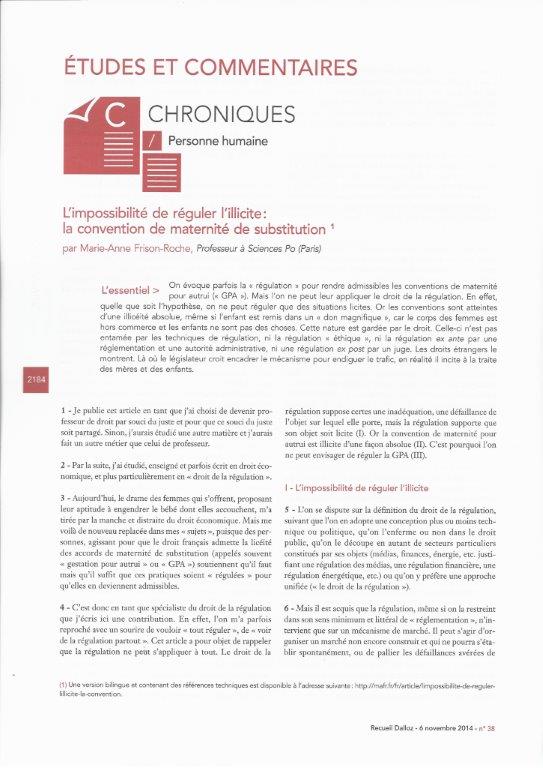
April 24, 2020
Publications

Its subject is the confrontation between the current health crisis situation and the Compliance Law.
Summary. After defining Compliance Law, distinguishing the procedural and poor definition and the substantial and rich definition, the starting point is to admit the aporia: the type of health crisis caused by Covid-19 will be renewed and it is imperative to prevent it, even to manage it, then to organize the crisis exit. Public Authorities are legitimate to do so, but because this type of crisis being global and the State being consubstantially linked to borders, States are hardly powerful. Their traditional International Law shows their limits in this current crisis and one cannot hope that this configulration will improve radically.
In contrast, some companies and markets, notably the financial markets, are global. But the markets are not legitimate to carry out such missions and counting on the generosity of certain large companies is far too fragile in front of the "monumental goal" that is the prevention of the next health crisis, crisis which must never happen.
How to get out of this aporia?
By Compliance Law, basis of, in a literal and strong sense, the "Law of the Future".
We need to be inspired by the Banking and Financial Compliance Law. Designed in the United States after the 1929 crisis to tend towards the "monumental goal" of the absence of a new devastating crisis in the country and the world, this set of new legal mechanisms gave duty and power of supervision, regulation and compliance to market authorities and central bankers. These are independent of governments but in constant contact with them. Today, they claim to have as first priority the fight against climate change. Now and for the future, they must also be given the responsibility and the powers to prevent a global health disaster, similar to a global ecological disaster, similar to a global financial disaster. This does not require a modification of the texts because their mandate consists in fighting instability. Stability must become a primary legal principle, of which the fight against monetary instability was only a first example. By the new use that central banks must make of it by preventing and managing health crises, Compliance Law will ensure that the future will be not catastrophic.

Updated: Sept. 24, 2019 (Initial publication: Aug. 31, 2019)
Publications

Summary : In August 2019, about the fire devastating the Amazon, the French Minister of Ecology says that this fact "is not just the business of a state" (n'est pas que l'affaire d'un Etat). This assertion denies the postulates of Public International Iaw (I). This supposes a new system, based on the idea that the power of the State on its territory is erased when the object that is there is no longer related to this "part" but to the All that is Universe (II). Let's accept the augur. First question: if it is not only the case of a State, whose business is it? (III). Second question: to anticipate the other cases that fall under this regime, what should be the criteria in the name of which the All will have to prevail over the part and who will then take care of the case of which the "local" State is divested? (IV). Because the perspective goes beyond the environment, beyond Brazil, beyond the States. It leads to Compliance Law animated by "monumental goals" that are the concern for the Universe and humans, in a humanist spirit. Let's go.
___
On August 27, 2019, on the French radio France Inter, Elisabeth Borne, French Minister of Ecology (Transition écologique) expresses it clearly: "Quand on est sur un enjeu tel que l'Amazonie, ça n'est pas que l'affaire d'un État", that can be translated : "When we are on a stake such as the Amazon, it is not only the business of one State ".
Starting from one case, "the Amazon", the Minister, thus taking up the position of the French President, associates a general consequence: "it is not only the affair of one State".
This is not a trivial sentence.
This affirmation denies, and why not, the entire system of Public International Law (I). By a new reasoning based on the idea that the All prevails, as by an effect of nature, on the Part (II).
Admitting this, it leads to opening two sets of questions. The first is related to the following main question: if it is not only the case of one State, of which is this the concern (III)? The second set of questions revolves around the questioning of the criteria on behalf of which other cases must be seized in the name of "All " and how to do it (IV).
A. The postulate of Public (and Private) International Law: parties (States) which, because of common interests, are in contact
The notion of State includes in its very definition the notion of territory (a territory, a population, institutions).
Thus the State governs through its institutions what is happening on its territory. For example, if there is a fire, or a risk of fire, the State makes arrangements through all legal, financial, technical and human instruments available to it. It is accountable for what it does through its political and legal responsibility.
When what is happening on its territory exceeds this one, in fact (epidemic, catastrophe with the consequences exceeding the borders, migrations, etc.) either according to its own opinion or according to that of the other States, the States, being sovereign subjects of Law in the international system, act together on a pre-built legal basis: bilateral or/and multilateral treaties!footnote-1675, having created legal integrated zones (like the European Union or the United States) or international institutions (like the IMF).
A particular technique has been developed for several millennia - but here again the seniority is not sufficient to keep the system: diplomacy, anchored in each state in a particular ministry: the Ministry of Foreign Affairs, which each national government has. If one State totally excludes one phenomenon in the territory of another, the progressive procedure of ceasing diplomatic ties begins.
This can result in wars.
In the "case of the Amazon" both the President of Brazil and the President of the United States stick to the classical construction of Law.
Indeed, the former asserted that the Amazon is in the territory of Brazil, thus falls under the jurisdiction of the power of the Brazilian State and the Brazilian Law, from which it follows that another State does not have to come to interfere. However, the French President takes the floor not as this forest extends also on a French territory but as it is the business of the World. On the contrary, the President of Brazil claims the closing effect, which excludes a third State from taking over directly something - even a difficulty - that takes place in the territory of another.
The President of the US federal State has said that these are joint decisions between the President of Brazil and other heads of State, sovereign subjects of Law, who must agree to organize a solution to solve a local problem . Because in the same way that States can declare war, they can help each other!footnote-1676.
The whole Public (and Private) International Law is therefore based on this assumption: "parts" of the world, on which sovereign parties (States) have taken contact, because circumstances make something that falls within one of them or several others.
This is precisely what is called into question. The notion of the "right of interference", whose evocation we hardly hear any more, had already done so. But on another basis.
B. The "right of interference": idea that somebody can directly interfere with what happens in a country , an idea that does not question the postulate of the International Maw, an idea that rests on something else: a " right for the other "
The "right of interference" is the idea that in certain territories, things happen that are inadmissible.
In memory of the jus cogens, a kind of "Natural Law" of Public International Law, Another, that could be another state, can come to meddle with what is happening in a territory that is closed, without declaring war. to the state that keeps its borders.
It is the need of others, for example those who die in mass on this territory, or the nature that is devastated in the indifference of the State on whose soil the disaster is happening, which founds this "right" of another state to come and take charge.
The foundation of this "right" is therefore a "duty".
C. The new idea: a territory is only part of the Globe, whose fate is everyone's concern
The idea is new because it is not based on altruism. And no more about self-interest. Yet, de facto and de jure , the Amazon is not on the sole territory of Brazil.
France is particularly well placed to say something about it since part of the Amazon is on French territory.
Thus the inaction of the main concerned Brazil directly affects the interest of France, a "forest" being a block that can not be divided. If we were in Property Law, we would say that we are in indivision with Brazil and that in this respect, with the other States on whose territories this forest extends, a solution must be found.
Because of the indivisibility of this particular object which is this particular fores!footnote-1644, it is necessary that the States whose territory is concerned have a say in the matter.
But this is not the argument put forward by France, particularly by the President of the Republic.
It is said that the whole world is concerned about the fate of the Amazon. It could be said that, in this respect, when what could be described as a "global forest" is well treated, its management does indeed fall within the power of Brazil, Brazilian companies and the Brazilian State, but when it is abused to the point of seeing its future compromised, when fires may make it disappear, then this forest appears not to be localized in Brazil but being located in the World, of which Brazil is only a part!footnote-1648.
This reasoning, which then gives voice to everyone, for in the world every state is included in it, is a new reasoning.
The economic-political theory of the "commons" does not account for it because it is not a very legal theory!footnote-1656.
II. THE NEW REASONING THAT COVERS THE CLASSIC REASONING OF PUBLIC INTERNATIONAL LAW
The new reasoning adopted by the Minister consists in saying that the Amazon does not concern only Brazil. This forest should therefore be directly related to the World (A). This is a welcome change in the system but based on a paradox (B).
A. When the Amazon is in danger of death, then it should no longer be attached to this part of the World that is Brazil, but directly to the World
This forest is presented as the "lung" of the planet, it is the "future" of humanity. In this, it can concern only one State, not even the one on whose territory this "Humanity good" is located!footnote-1643.
As such, without the need to declare war to Brazil, another State may speak, for example the French State through the one that represents it in the international order, that is to say its President, to say what to do, since according to him the President of Brazil does not say or do what it is absolutely necessary to do for the whole planet and for the future of Humanity.
This induces a complete renewal of international institutions.
Indeed a direct attachment to the World and no longer to Brazil gives the forest object a special status because of a goal that exceeds Brazil: save the Amazon would impose because it would save the world. Therefore, it can no longer be the subject of Brazil, which would be like "dispossessed" by a goal that is imposed on it: to save the Amazon rainforest, even though it is mainly on its territory, while other States become legitimate to dispose of this object, even if the forest would not be in part in their territory, even if they would not be affected in their own interests.
This contradicts all Public International Law!footnote-1645; because the agreement of the political representatives of Brazil is no longer required and no one yet evokes the need to declare war to Brazil, and fortunately!
Such an upheaval justifies that such an affirmation is accepted with difficulty. One understands better than first consequence, which is not so innocuous, one of the first rules of diplomacy which is the politeness, between the heads of state, with regard to the spouses of these , have be broken!footnote-1657, that the remarks have slipped on personal questions, etc.
B. A welcome but paradoxical change in the system
Why not change the system?
This is difficult to admit, not only because it is brutal, but because it is paradoxical.
The paradox is the following. It is recognized that the theme of the disappearance of borders by "globalization"!footnote-1647 no longer reproduces the reality of facts!footnote-1646, especially not the Chinese situation, the digitalization having on the contrary allowed the construction of even stronger boundaries. What we called "globalization" now belongs to the pastWhat we called "globalization" now belongs to the past!footnote-1660. So today we should recognize on one side the reality of borders - which had not disappeared or are reborn - but only to better step over them, since - based on the concern of the world - states, yet each in their borders, would be legitimate to go directly to intervene in the business of others.
The paradox is therefore, on the one hand, the rejection of the allegation of a de facto disappearance of borders by an economic interdependence, technology having denied "globalization" as a fact !footnote-1649 and the linked resurgence of borders allowing States to affirm more than ever that they would be "sovereign masters at home", which should logically lead to let Brazil decide for the Amazon, while yet on the other side we witness the questioning of the postulate of Public International Law as recognition of sovereignty and construction from agreements between states, requiring the agreement of the state whose territory is concerned (except war), questioning which leads to allow all to meddle with the fate of the Amazon, as if there was no border.
This paradox leads to two questions.
The first question is: if "it's not juste one State affair", who's concerned?
The second question is: after the "case of the Amazon", what are the other cases? And how are we going to provide solutions, if we no longer have the solutions of Public International Law, that is to say, the agreement of the country whose territory is concerned and which we do not want not go to war?
If we have clear ideas on the answers to be given to these two sets of questions, then because indeed when the future of all is in progress it can not be the affair of a single State, it is necessary to question Public International Law. But do we have clear ideas on these two questions? And what are the possibilities for possible solutions?
See the text following below.
Dec. 30, 2016
Blog

Un débat sur la GPA s'est déroulé le 14 décembre 2016 à la Chambre des Lords.
Y ont pris la parole des membres de cette institution pour que le Gouvernement anglais modifie la loi britannique, afin que les dernières limites à un marché prospère des femmes et des enfants sur le sol anglais disparaissent.
La loi britannique de 1985 est pourtant très favorable à la GPA. Mais cela ne semble pas suffire. Des membres de la Chambre des Lord, institution qui a aujourd'hui peu de pouvoirs et qui s'adresse ici au Gouvernement britannique, "pressent" celui-ci de changer le dispositif.
Contrairement à la loi française qui pose que la GPA est atteinte de nullité absolue parce que le corps des femmes est hors commerce et que l'on ne saurait faire naître un enfant à seule fin de le céder, même gratuitement, la loi britannique admet le principe de la GPA au bénéfice des couples dès l'instant qu'il s'agit d'une "GPA éthique", qualité qui serait obtenue du seul fait que la mère-porteuse reçoit une somme d'argent dont le montant est limité par la loi.
Les pairs de la Chambre des Lords, institution dont le rôle législatif est modeste par rapport à la Chambre des Communes mais qui ont une influence importante, ont eu un débat, dont la teneur est reproduite par la BBC.
Voilà les modifications demandées. Elles sont très importantes, puisqu'il s'agit de modifier la loi britannique pour que la mère n'ait plus aucun droit et, rétrogradée à être "porteuse", ne puisse plus prétendre qu'à de l'argent (I).
Plus précisément, la première modification du droit demandée concerne l'anéantissement du droit de la mère de garder son enfant à la naissance, en ne donnant pas son consentement au parental order . Il s'agit d'accroitre l'efficacité de celui-ci en insérant dans le droit britannique un parental order avant la naissance rattachant définitivement l'enfant à naître aux commanditaires, afin de parfaire l'élimination de la mère (A). La deuxième modification du droit consiste à ouvrir l'accès à la GPA à un ou une célibataire, en admettant donc qu'un enfant puisse naître d'une pure manifestation de volonté. Le parallèle est fait entre adoption et GPA, alors que les deux mécanismes sont inverses. (B).
Pour justifier un tel effacement de la mère, il faut une très forte raison : elle tient dans l'affirmation d'une sorte de "droit absolu à l'enfant" (II). S'il existe un droit de toute personne à devenir parent, alors effectivement une personne seule doit pouvoir utiliser une femme comme moyen pour obtenir l'enfant désiré. S'il n'y a pas assez de femmes disponibles, effectivement il faut accroître l'offre pour que celle-ci rencontre cette demande d'enfant. Des femmes, les lords n'en parlent pas. De l'insuffisance de l'offre domestique et du recours massif aux marchés étrangers, les lords n'en parlent pas. (A). Pour admettre cela, encore faut-il transformer la demande d'enfant en droit à l'enfant. C'est admettre que l'enfant est une chose. (B).
Lire ci-joint l'analyse détaillée.
April 16, 2016
Blog

Pour que le commerce des mères et des enfants devienne l'ordinaire, pour que la fabrication industrielles des enfants sur commande se mette en place, que leurs mères les remettent à la naissance à ceux qui ont payé pour cela sans que plus personne ne disent rien, il faut imposer une chose : la disparition des mères.
C'est en marche.
Les mères sont en train de disparaître.
Cela n'est pas facile. Pour deux raisons.
En premier lieu, parce que la dégradation des femmes, la dégradation de ces êtres humains en purs et simples moyens de satisfaction du "désir d'être parent" d'êtres humains est difficile à accepter.
En second lieu, parce que depuis toujours, les enfants ont été engendrés par leur mère. Même si elles abandonnent à leur naissance, ils ont une mère. Le Code civil organise l'accouchement sous X mais l'enfant n'est pas "sans mère". La mère peut être "inconnue", voire masquée de par sa volonté, mais l'enfant a une mère. Pour développer sans aucune entrave l'industrie des enfants, les entreprises martèlent avec douceur que les enfants sont engendrés par des femmes "gestatrices" qui ne soient pas leurs mères. C'est une rupture anthropologique totale.
Pourquoi l'opérer ?
Pour l'argent.
La fabrication industrielle des enfants, fabriqués à la demande selon les indications précisées par celui qui en veut un, enfants délivrés dans le nombre voulu à la personne qui le requiert, quelque que soit la situation de celui qui a manifesté sa volonté d'être parenté (homme ou femme, seul ou non, jeune ou vieux, etc.), voilà l'industrie de l'avenir : l'industrie dans laquelle l'humain est la matière première. Comme celle-ci peut être produite sans fin, par l'engendrement industriel à base de collecte d'ovocytes et de ventes disponibles, l'argent va couler à flot.
Pour cela, il faut casser les "tabous". Un tabou est un Non. Et les Non, les entreprises veulent les éliminer, elles qui vendent du "toujours possibles". Mais les tabous sont gardés par le Droit.
Le tabou premier et ultime, c'est le tabou de l'inceste.
Comment les entreprises peuvent faire tomber la prohibition de l'inceste, afin d'arriver dans un monde où "tout serait possible", contre les honoraires à la hauteur du désir de la prestation convoitée, un monde où seule règnerait la "Loi du Désir" dont le droit ne serait plus que la forme d'effectivité, c'est-à-dire un monde dont la seule substance serait la Loi du Marché !footnote-488 ?
Surtout pas en affrontant le Législateur, qui garde les règles fondamentales blocant les volontés particulières, notamment par l'ordre public!footnote-489. Pour le submerger en douceur, il est efficace de faire parler les "innocents", car l'innocence est l'arme sophistique des entreprises, l'innocence des nouveaux-nés - qui ne peuvent "mal vouloir" et désormais l'innocence de ceux qui recourent à la GPA entre frère et sœur.
Mesurez comme cela est bien fait. Pas de grands mots, pas de concepts, pas de principes, que des jolies histoires de bonheurs et de joies. Par exemple, un homme raconte donc en janvier 2016 l'extraordinaire aventure par laquelle sa sœur lui a offert son enfant.
Lire ci-dessous l'analyse de ce récit et sa confrontation à la réalité d'un enfant engendré par un frère et sa sœur, conduisant à une revendication logique à l'effacement de la mère sauf au Droit à nier la prohibition de l'inceste.
Nov. 6, 2014
Publications
 ► Référence complète : M.-A. Frison-Roche, « L'impossibilité de réguler l'illicite : la convention de maternité de substitution", D. 2014, pp.2184-2187.
► Référence complète : M.-A. Frison-Roche, « L'impossibilité de réguler l'illicite : la convention de maternité de substitution", D. 2014, pp.2184-2187.
____
____
🚧Lire le document de travail, bilingue, doté de développements supplémentaires, de références techniques et de liens hypertextes.
Le thème a également donné lieu à un article de presse générale, publié dans le Huffington Post le 20 octobre 2014 sous le titre Les limites des bienfaits de la régulation : la convention de maternité de substitution (GPA)
____
► Résumé de cet article : On évoque parfois la "régulation" pour rendre admissible les convention de maternité pour autrui ("GPA"). Mais l'on ne peut leur appliquer le droit de la régulation. En effet, quelle que soit l'hypothèse, on ne peut réguler que des situations licites. Or, ces conventions sont atteintes d'une illicéité absolue, même si l'effet est remis dans un "don magnifique", car le corps des femmes est hors-commerce et les enfants ne sont pas des choses.
Cette nature est gardée par le droit. Celle-ci n'est pas entamée par les techniques de régulation, ni la régulation "éthique", ni la régulation ex ante par une réglementation et une autorité administrative, ni une régulation ex post par un juge. Les droits étrangers le montrent.Là où le Législateur croit encadrer le mécanisme pour endiguer le trafic, en réalité il incite à la traite des mères et des enfants.
________